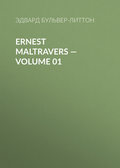
Эдвард Бульвер-Литтон
The Last Days of Pompeii
Chapter VI
A REUNION OF DIFFERENT ACTORS. STREAMS THAT FLOWED APPARENTLY APART RUSH INTO ONE GULF.
IMPATIENT to learn whether the fell drug had yet been administered by Julia to his hated rival, and with what effect, Arbaces resolved, as the evening came on, to seek her house, and satisfy his suspense. It was customary, as I have before said, for men at that time to carry abroad with them the tablets and the stilus attached to their girdle; and with the girdle they were put off when at home. In fact, under the appearance of a literary instrument, the Romans carried about with them in that same stilus a very sharp and formidable weapon. It was with his stilus that Cassius stabbed Caesar in the senate-house. Taking, then, his girdle and his cloak, Arbaces left his house, supporting his steps, which were still somewhat feeble (though hope and vengeance had conspired greatly with his own medical science, which was profound, to restore his natural strength), by his long staff—Arbaces took his way to the villa of Diomed.
And beautiful is the moonlight of the south! In those climes the night so quickly glides into the day, that twilight scarcely makes a bridge between them. One moment of darker purple in the sky—of a thousand rose-hues in the water—of shade half victorious over light; and then burst forth at once the countless stars—the moon is up—night has resumed her reign!
Brightly then, and softly bright, fell the moonbeams over the antique grove consecrated to Cybele—the stately trees, whose date went beyond tradition, cast their long shadows over the soil, while through the openings in their boughs the stars shone, still and frequent. The whiteness of the small sacellum in the centre of the grove, amidst the dark foliage, had in it something abrupt and startling; it recalled at once the purpose to which the wood was consecrated—its holiness and solemnity.
With a swift and stealthy pace, Calenus, gliding under the shade of the trees, reached the chapel, and gently putting back the boughs that completely closed around its rear, settled himself in his concealment; a concealment so complete, what with the fane in front and the trees behind, that no unsuspicious passenger could possibly have detected him. Again, all was apparently solitary in the grove: afar off you heard faintly the voices of some noisy revellers or the music that played cheerily to the groups that then, as now in those climates, during the nights of summer, lingered in the streets, and enjoyed, in the fresh air and the liquid moonlight, a milder day.
From the height on which the grove was placed, you saw through the intervals of the trees the broad and purple sea, rippling in the distance, the white villas of Stabiae in the curving shore, and the dim Lectiarian hills mingling with the delicious sky. Presently the tall figure of Arbaces, in his way to the house of Diomed, entered the extreme end of the grove; and at the same instant Apaecides, also bound to his appointment with Olinthus, crossed the Egyptian's path.
'Hem! Apaecides,' said Arbaces, recognizing the priest at a glance; 'when last we met, you were my foe. I have wished since then to see you, for I would have you still my pupil and my friend.'
Apaecides started at the voice of the Egyptian; and halting abruptly, gazed upon him with a countenance full of contending, bitter, and scornful emotions.
'Villain and impostor!' said he at length; 'thou hast recovered then from the jaws of the grave! But think not again to weave around me thy guilty meshes. Retiarius, I am armed against thee!'
'Hush!' said Arbaces, in a very low voice—but his pride, which in that descendant of kings was great, betrayed the wound it received from the insulting epithets of the priest in the quiver of his lip and the flush of his tawny brow. 'Hush! more low! thou mayest be overheard, and if other ears than mine had drunk those sounds—why…'
'Dost thou threaten?—what if the whole city had heard me?'
'The manes of my ancestors would not have suffered me to forgive thee. But, hold, and hear me. Thou art enraged that I would have offered violence to thy sister. Nay, peace, peace, but one instant, I pray thee. Thou art right; it was the frenzy of passion and of jealousy—I have repented bitterly of my madness. Forgive me; I, who never implored pardon of living man, beseech thee now to forgive me. Nay, I will atone the insult—I ask thy sister in marriage—start not—consider—what is the alliance of yon holiday Greek compared to mine? Wealth unbounded—birth that in its far antiquity leaves your Greek and Roman names the things of yesterday—science—but that thou knowest! Give me thy sister, and my whole life shall atone a moment's error.'
'Egyptian, were even I to consent, my sister loathes the very air thou breathest: but I have my own wrongs to forgive—I may pardon thee that thou hast made me a tool to thy deceits, but never that thou hast seduced me to become the abettor of thy vices—a polluted and a perjured man. Tremble!—even now I prepare the hour in which thou and thy false gods shall be unveiled. Thy lewd and Circean life shall be dragged to day—thy mumming oracles disclosed—the fane of the idol Isis shall be a byword and a scorn—the name of Arbaces a mark for the hisses of execration! Tremble!'
The flush on the Egyptian's brow was succeeded by a livid paleness. He looked behind, before, around, to feel assured that none were by; and then he fixed his dark and dilating eye on the priest, with such a gaze of wrath and menace, that one, perhaps, less supported than Apaecides by the fervent daring of a divine zeal, could not have faced with unflinching look that lowering aspect. As it was, however, the young convert met it unmoved, and returned it with an eye of proud defiance.
'Apaecides,' said the Egyptian, in a tremulous and inward tone, 'beware! What is it thou wouldst meditate? Speakest thou—reflect, pause before thou repliest—from the hasty influences of wrath, as yet divining no settled purpose, or from some fixed design?'
'I speak from the inspiration of the True God, whose servant I now am,' answered the Christian, boldly; 'and in the knowledge that by His grace human courage has already fixed the date of thy hypocrisy and thy demon's worship; ere thrice the sun has dawned, thou wilt know all! Dark sorcerer, tremble, and farewell!'
All the fierce and lurid passions which he inherited from his nation and his clime, at all times but ill concealed beneath the blandness of craft and the coldness of philosophy, were released in the breast of the Egyptian. Rapidly one thought chased another; he saw before him an obstinate barrier to even a lawful alliance with Ione—the fellow-champion of Glaucus in the struggle which had baffled his designs—the reviler of his name—the threatened desecrator of the goddess he served while he disbelieved—the avowed and approaching revealer of his own impostures and vices. His love, his repute, nay, his very life, might be in danger—the day and hour seemed even to have been fixed for some design against him. He knew by the words of the convert that Apaecides had adopted the Christian faith: he knew the indomitable zeal which led on the proselytes of that creed. Such was his enemy; he grasped his stilus—that enemy was in his power! They were now before the chapel; one hasty glance once more he cast around; he saw none near—silence and solitude alike tempted him.
'Die, then, in thy rashness!' he muttered; 'away, obstacle to my rushing fates!'
And just as the young Christian had turned to depart, Arbaces raised his hand high over the left shoulder of Apaecides, and plunged his sharp weapon twice into his breast.
Apaecides fell to the ground pierced to the heart—he fell mute, without even a groan, at the very base of the sacred chapel.
Arbaces gazed upon him for a moment with the fierce animal joy of conquest over a foe. But presently the full sense of the danger to which he was exposed flashed upon him; he wiped his weapon carefully in the long grass, and with the very garments of his victim; drew his cloak round him, and was about to depart, when he saw, coming up the path, right before him, the figure of a young man, whose steps reeled and vacillated strangely as he advanced: the quiet moonlight streamed full upon his face, which seemed, by the whitening ray, colorless as marble. The Egyptian recognized the face and form of Glaucus. The unfortunate and benighted Greek was chanting a disconnected and mad song, composed from snatches of hymns and sacred odes, all jarringly woven together.
'Ha!' thought the Egyptian, instantaneously divining his state and its terrible cause; 'so, then, the hell-draught works, and destiny hath sent thee hither to crush two of my foes at once!'
Quickly, even ere this thought occurred to him, he had withdrawn on one side of the chapel, and concealed himself amongst the boughs; from that lurking place he watched, as a tiger in his lair, the advance of his second victim. He noted the wandering and restless fire in the bright and beautiful eyes of the Athenian; the convulsions that distorted his statue-like features, and writhed his hueless lip. He saw that the Greek was utterly deprived of reason. Nevertheless, as Glaucus came up to the dead body of Apaecides, from which the dark red stream flowed slowly over the grass, so strange and ghastly a spectacle could not fail to arrest him, benighted and erring as was his glimmering sense. He paused, placed his hand to his brow, as if to collect himself, and then saying:
'What ho! Endymion, sleepest thou so soundly? What has the moon said to thee? Thou makest me jealous; it is time to wake'—he stooped down with the intention of lifting up the body.
Forgetting—feeling not—his own debility, the Egyptian sprung from his hiding-place, and, as the Greek bent, struck him forcibly to the ground, over the very body of the Christian; then, raising his powerful voice to its highest pitch, he shouted:
'Ho, citizens—oh! help me!—run hither—hither!—A murder—a murder before your very fane! Help, or the murderer escapes!' As he spoke, he placed his foot on the breast of Glaucus: an idle and superfluous precaution; for the potion operating with the fall, the Greek lay there motionless and insensible, save that now and then his lips gave vent to some vague and raving sounds.
As he there stood awaiting the coming of those his voice still continued to summons, perhaps some remorse, some compunctious visitings—for despite his crimes he was human—haunted the breast of the Egyptian; the defenceless state of Glaucus—his wandering words—his shattered reason, smote him even more than the death of Apaecides, and he said, half audibly, to himself:
'Poor clay!—poor human reason; where is the soul now? I could spare thee, O my rival—rival never more! But destiny must be obeyed—my safety demands thy sacrifice.' With that, as if to drown compunction, he shouted yet more loudly; and drawing from the girdle of Glaucus the stilus it contained, he steeped it in the blood of the murdered man, and laid it beside the corpse.
And now, fast and breathless, several of the citizens came thronging to the place, some with torches, which the moon rendered unnecessary, but which flared red and tremulously against the darkness of the trees; they surrounded the spot. 'Lift up yon corpse,' said the Egyptian, 'and guard well the murderer.'
They raised the body, and great was their horror and sacred indignation to discover in that lifeless clay a priest of the adored and venerable Isis; but still greater, perhaps, was their surprise, when they found the accused in the brilliant and admired Athenian.
'Glaucus!' cried the bystanders, with one accord; 'is it even credible?'
'I would sooner,' whispered one man to his neighbor, 'believe it to be the Egyptian himself.'
Here a centurion thrust himself into the gathering crowd, with an air of authority.
'How! blood spilt! who the murderer?'
The bystanders pointed to Glaucus.
'He!—by Mars, he has rather the air of being the victim!
'Who accuses him?'
'I,' said Arbaces, drawing himself up haughtily; and the jewels which adorned his dress flashing in the eyes of the soldier, instantly convinced that worthy warrior of the witness's respectability.
'Pardon me—your name?' said he.
'Arbaces; it is well known methinks in Pompeii. Passing through the grove, I beheld before me the Greek and the priest in earnest conversation. I was struck by the reeling motions of the first, his violent gestures, and the loudness of his voice; he seemed to me either drunk or mad. Suddenly I saw him raise his stilus—I darted forward—too late to arrest the blow. He had twice stabbed his victim, and was bending over him, when, in my horror and indignation, I struck the murderer to the ground. He fell without a struggle, which makes me yet more suspect that he was not altogether in his senses when the crime was perpetrated; for, recently recovered from a severe illness, my blow was comparatively feeble, and the frame of Glaucus, as you see, is strong and youthful.'
'His eyes are open now—his lips move,' said the soldier. 'Speak, prisoner, what sayest thou to the charge?'
'The charge—ha—ha! Why, it was merrily done; when the old hag set her serpent at me, and Hecate stood by laughing from ear to ear—what could I do? But I am ill—I faint—the serpent's fiery tongue hath bitten me. Bear me to bed, and send for your physician; old AEsculapius himself will attend me if you let him know that I am Greek. Oh, mercy—mercy! I burn!—marrow and brain, I burn!'
And, with a thrilling and fierce groan, the Athenian fell back in the arms of the bystanders.
'He raves,' said the officer, compassionately; 'and in his delirium he has struck the priest. Hath any one present seen him to-day!'
'I,' said one of the spectators, 'beheld him in the morning. He passed my shop and accosted me. He seemed well and sane as the stoutest of us!'
'And I saw him half an hour ago,' said another, 'passing up the streets, muttering to himself with strange gestures, and just as the Egyptian has described.'
'A corroboration of the witness! it must be too true. He must at all events to the praetor; a pity, so young and so rich! But the crime is dreadful: a priest of Isis, in his very robes, too, and at the base itself of our most ancient chapel!'
At these words the crowd were reminded more forcibly, than in their excitement and curiosity they had yet been, of the heinousness of the sacrilege. They shuddered in pious horror.
'No wonder the earth has quaked,' said one, 'when it held such a monster!'
'Away with him to prison—away!' cried they all.
And one solitary voice was heard shrilly and joyously above the rest: 'The beasts will not want a gladiator now, Ho, ho, for the merry, merry show!
It was the voice of the young woman whose conversation with Medon has been repeated.
'True—true—it chances in season for the games!' cried several; and at that thought all pity for the accused seemed vanished. His youth, his beauty, but fitted him better for the purpose of the arena.
'Bring hither some planks—or if at hand, a litter—to bear the dead,' said Arbaces: 'a priest of Isis ought scarcely to be carried to his temple by vulgar hands, like a butchered gladiator.'
At this the bystanders reverently laid the corpse of Apaecides on the ground, with the face upwards; and some of them went in search of some contrivance to bear the body, untouched by the profane.
It was just at that time that the crowd gave way to right and left as a sturdy form forced itself through, and Olinthus the Christian stood immediately confronting the Egyptian. But his eyes, at first, only rested with inexpressible grief and horror on that gory side and upturned face, on which the agony of violent death yet lingered.
'Murdered!' he said. 'Is it thy zeal that has brought thee to this? Have they detected thy noble purpose, and by death prevented their own shame?'
He turned his head abruptly, and his eyes fell full on the solemn features of the Egyptian.
As he looked, you might see in his face, and even the slight shiver of his frame, the repugnance and aversion which the Christian felt for one whom he knew to be so dangerous and so criminal. It was indeed the gaze of the bird upon the basilisk—so silent was it and so prolonged. But shaking off the sudden chill that had crept over him, Olinthus extended his right arm towards Arbaces, and said, in a deep and loud voice:
'Murder hath been done upon this corpse! Where is the murderer? Stand forth, Egyptian! For, as the Lord liveth, I believe thou art the man!'
An anxious and perturbed change might for one moment be detected on the dusky features of Arbaces; but it gave way to the frowning expression of indignation and scorn, as, awed and arrested by the suddenness and vehemence of the charge, the spectators pressed nearer and nearer upon the two more prominent actors.
'I know,' said Arbaces, proudly, 'who is my accuser, and I guess wherefore he thus arraigns me. Men and citizens, know this man for the most bitter of the Nazarenes, if that or Christians be their proper name! What marvel that in his malignity he dares accuse even an Egyptian of the murder of a priest of Egypt!'
'I know him! I know the dog!' shouted several voices. 'It is Olinthus the Christian—or rather the Atheist—he denies the gods!'
'Peace, brethren,' said Olinthus, with dignity, 'and hear me! This murdered priest of Isis before his death embraced the Christian faith—he revealed to me the dark sins, the sorceries of yon Egyptian—the mummeries and delusions of the fane of Isis. He was about to declare them publicly. He, a stranger, unoffending, without enemies! who should shed his blood but one of those who feared his witness? Who might fear that testimony the most?—Arbaces, the Egyptian!'
'You hear him!' said Arbaces; 'you hear him! he blasphemes! Ask him if he believes in Isis!'
'Do I believe in an evil demon?' returned Olinthus, boldly.
A groan and shudder passed through the assembly. Nothing daunted, for prepared at every time for peril, and in the present excitement losing all prudence, the Christian continued:
'Back, idolaters! this clay is not for your vain and polluting rites—it is to us—to the followers of Christ, that the last offices due to a Christian belong. I claim this dust in the name of the great Creator who has recalled the spirit!'
With so solemn and commanding a voice and aspect the Christian spoke these words, that even the crowd forbore to utter aloud the execration of fear and hatred which in their hearts they conceived. And never, perhaps, since Lucifer and the Archangel contended for the body of the mighty Lawgiver, was there a more striking subject for the painter's genius than that scene exhibited. The dark trees—the stately fane—the moon full on the corpse of the deceased—the torches tossing wildly to and fro in the rear—the various faces of the motley audience—the insensible form of the Athenian, supported, in the distance, and in the foreground, and above all, the forms of Arbaces and the Christian: the first drawn to its full height, far taller than the herd around; his arms folded, his brow knit, his eyes fixed, his lip slightly curled in defiance and disdain. The last bearing, on a brow worn and furrowed, the majesty of an equal command—the features stern, yet frank—the aspect bold, yet open—the quiet dignity of the whole form impressed with an ineffable earnestness, hushed, as it were, in a solemn sympathy with the awe he himself had created. His left hand pointing to the corpse—his right hand raised to heaven.
The centurion pressed forward again.
'In the first place, hast thou, Olinthus, or whatever be thy name, any proof of the charge thou hast made against Arbaces, beyond thy vague suspicions?'
Olinthus remained silent—the Egyptian laughed contemptuously.
'Dost thou claim the body of a priest of Isis as one of the Nazarene or Christian sect?'
'I do.'
'Swear then by yon fane, yon statue of Cybele, by yon most ancient sacellum in Pompeii, that the dead man embraced your faith!'
'Vain man! I disown your idols! I abhor your temples! How can I swear by Cybele then?'
'Away, away with the Atheist! away! the earth will swallow us, if we suffer these blasphemers in a sacred grove—away with him to death!'
'To the beasts!' added a female voice in the centre of the crowd; 'we shall have one a-piece now for the lion and tiger!'
'If, O Nazarene, thou disbelievest in Cybele, which of our gods dost thou own?' resumed the soldier, unmoved by the cries around.
'None!'
'Hark to him! hark!' cried the crowd.
'O vain and blind!' continued the Christian, raising his voice: 'can you believe in images of wood and stone? Do you imagine that they have eyes to see, or ears to hear, or hands to help ye? Is yon mute thing carved by man's art a goddess!—hath it made mankind?—alas! by mankind was it made. Lo! convince yourself of its nothingness—of your folly.'
And as he spoke he strode across to the fane, and ere any of the bystanders were aware of his purpose, he, in his compassion or his zeal, struck the statue of wood from its pedestal.
'See!' cried he, 'your goddess cannot avenge herself. Is this a thing to worship?'
Further words were denied to him: so gross and daring a sacrilege—of one, too, of the most sacred of their places of worship—filled even the most lukewarm with rage and horror. With one accord the crowd rushed upon him, seized, and but for the interference of the centurion, they would have torn him to pieces.
'Peace!' said the soldier, authoritatively—'refer we this insolent blasphemer to the proper tribunal—time has been already wasted. Bear we both the culprits to the magistrates; place the body of the priest on the litter—carry it to his own home.'
At this moment a priest of Isis stepped forward. 'I claim these remains, according to the custom of the priesthood.'
'The flamen be obeyed,' said the centurion. 'How is the murderer?'
'Insensible or asleep.'
'Were his crimes less, I could pity him. On!'
Arbaces, as he turned, met the eye of that priest of Isis—it was Calenus; and something there was in that glance, so significant and sinister, that the Egyptian muttered to himself:
'Could he have witnessed the deed?'
A girl darted from the crowd, and gazed hard on the face of Olinthus. 'By Jupiter, a stout knave! I say, we shall have a man for the tiger now; one for each beast!'
'Ho!' shouted the mob; 'a man for the lion, and another for the tiger! What luck! Io Paean!'







